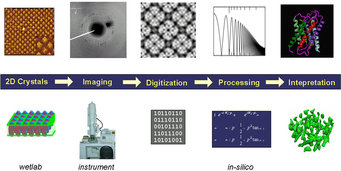EC boosts European Electron Microscopy Research
The 3D-EM Network of Excellence will work towards the 3D imaging of cells at atomic resolution
The European Commission has awarded a 10 Million Euro grant to foster the collaboration of European experts in the field of Electron Microscopy. A consortium of 15 leading European laboratories in electron microscopy and the internationally leading manufacturer for high performance instrumentation for life sciences, FEI Electron Optics, are the founding members of a "Network of Excellence" for three-dimensional Electron Microscopy. The "3D-EM" Network will be coordinated by Prof. A. Engel, Biozentrum Basel, Switzerland. It will provide a European forum operating in various fields of structural research to coordinate research, training activities, research-industry collaboration and the transfer of knowledge in the field of Electron Microscopy.

The 3D-EM Network of Excellence brings together the leading scientists in electron microscopy (EM) from seven European countries. The specialists for the various EM-technologies electron tomography, single particle analysis, and electron crystallography will combine their expertise to reach a very ambitious goal: the three-dimensional (3D) imaging of macromolecules and molecular machines at atomic resolution, with the prospect of a 3D imaging of cell organelles and whole cells.
The determination of the 3D structure of macromolecules (as e.g. proteins), of their interactions and their localisation in cells is essential for the understanding of complex biological processes. It is of particular interest to biotechnological and biomedical companies in the development of novel pharmaceuticals. Recognizing the emerging demand for this type of "Structural Genomics" research, the European Commission has opened opportunities for funding within its Sixth' Research Framework Programme.
The 3D-EM Network of Excellence will provide a platform to integrate and coordinate the efforts of individual European research groups in the EM field. The collaborative activities of the Network will foster innovation and the spreading of novel technology and methodology in the individual partner laboratories. A close cooperation of the 3D-EM Network with the European Microscopy Society (EMS) will support the dissemination of information on these innovations throughout the EM community.
In the five years to come, activities in the 3D-EM consortium will focus on:
(1) The development of a high level training programme in structural biology. The training activities will be established in close collaboration with the European Molecular Biology Lab, Heidelberg (EMBL), the organizer of the renowned series of high level "EMBO-courses". Training courses and workshops will be offered in various areas, including cryo electron microscopy, electron tomography, bio computing, and image processing. They will be instrumental in the dissemination of state-of-the-art methodology in the EM field to the research community.
(2) The foundation of an EM structural database. It will serve as the standard repository for EM structures and provide the essential basis for a comparability of data and their facilitated exchange. Standard data formats and validation standards will be developed according to the demands of the 3D-EM consortium in close collaboration with existing structural databases in the EU and USA.
(3) The creation of a user-friendly software platform. Novel, standardised protocols for structural analysis will be elaborated in a joint effort of the research community and manufacturers. They will enhance the throughput and reduce the requirement for specialist-skills in structural analysis. The public dissemination of novel standard procedures through 3D-EM ultimately will allow state-of-the-art structural research to be performed all over Europe.
The 3D-EM Network of Excellence officially started operating on March 1, 2004. The project was kicked-off during a meeting at the Max-Planck Institute of Biochemistry, Martinsried, end of March 2004.
3D-EM Partner Institutions:
University Basel, Biozentrum, Basel, Switzerland
Max Planck Society for the Advancement of Science, Germany: MPI of Biochemistry and MPI of Biophysics
Centro Nacional de Biotecnologia, CSIC, Madrid, Spain
European Molecular Biology Lab, Heidelberg, D, and EMBL-EBI, Hinxton, United Kingdom
FEI Electron Optics B.V., Eindhoven, The Netherlands
Karolinska Institutet, Stockholm, Sveden
Centre National de la Recherche Scientifique, Paris, France
Universite Pierre et Marie Curie, Paris, France
Chemistry Center, Lund University, Lund, Sveden
University of Utrecht, The Netherlands
The Chancellor, Masters and Scholars of the University of Oxford, United Kingdom
Imperial College, London, United Kingdom
Birkbeck College, London, United Kingdom
University of Lausanne, Switzerland
